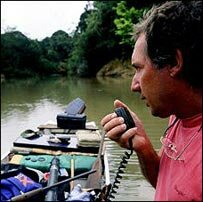Tue 24 May 2005

Duane DeFreitas and the Rupununi Express
Paul Rubens, BBC NEWS, reports:
Taking a break from setting up a small network, I head outside to see if the nearest building is likely to be able to pick up a wireless network signal. “Make sure you turn right at the bottom of the stairs,” says my host, “or the jaguar will eat you.”
Welcome to the surreal world of Duane DeFreitas, an adventurer and guide living in the tropical rainforest of Guyana.
DeFreitas spends months at a time in the jungle, exploring the wilderness, photographing wildlife, and acting as a guide for researchers and intrepid travellers. The only means of transport are boats (if you don’t mind carrying them round the odd set of treacherous rapids) and feet.
There’s nothing to fear in the jungle, except crocodilians, piranhas, sting rays, venomous snakes, scorpions and carnivorous jaguars. Oh yes, and the beavers can give you a nasty bite too. Not surprisingly, most people in the jungle walk around with large knives, or “cutlasses” as they are known locally, just to be on the safe side.
When he’s not out in the forest, home to DeFreitas is Dadanawa ranch, a collection of wooden buildings in the middle of nowhere, including a slaughter house where lunch is killed, and a tannery where the skin from yesterday’s lunch is turned into leather.
Potentially lethal
DeFreitas has given up his collection of pet rattlesnakes after one bit him, but under the house is a collection of monkeys, and, tied to a piece of climbing rope attached to a cable stretched between two trees, the jaguar - healthy, lithe and potentially lethal - which he saved as a cub when its parents were killed.
Scattered around the place is a collection of old truck parts and bits of iron which may come in handy from time to time. Out here it pays to be self sufficient: the nearest town is across the Rupununi river and down a gruelling four-wheel-drive track - about three hours away in the dry season, or about three days away in the wet. There’s no telephone, no mains electricity, no anything really.
Except, surprisingly, broadband internet access, in all its glory. With a satellite dish outside the house, and electricity provided by solar panels and a current inverter, DeFreitas is possibly the world’s least likely internet nerd.
It’s amazing how useful the internet is when you’re out in the jungle.
At one point DeFreitas tells me that a plane I am scheduled to be taking in a few days’ time has been cancelled, but rearranging my travel plans is as easy as getting online and having an instant message chat by candlelight with someone in Georgetown, the capital.
Thanks to the internet, it’s possible for DeFreitas to stay in contact with Jacksonville Zoo, in Florida, which is sending a cage for the jaguar, and which will soon be taking the animal away where it can be looked after professionally.
Major problem
And using internet telephony program Skype, DeFreitas will soon be able to chat with other Skype users around the world - just as soon as he figures out where to get a microphone and speakers from.
Which highlights a major problem for the adventurer-nerd type. The internet brings a vast array of goods and services within reach, but how do you actually get your hands on them?
To use an internet telephony service to call regular telephone numbers, or to order most stuff online, you need to have a credit card. The trouble is that when you live in the jungle, you tend not to use - or even have - plastic. Which means if you live in Amazonia, you probably can’t use Amazon.
Still, the same old internet-related problems occur in the rainforest as in the most mundane broadband-connected home in suburban Britain. The principal one, of course, is that - with very little to do in the evenings apart from drinking rum and listening to the insects - the whole of DeFreitas’ family wants to use the internet at once.
Which is why it’s fallen to me to figure out how to configure an ancient router that’s appeared from somewhere to configure a network to cover the whole ranch, and why I need to see if a Wi-Fi signal would reach the wooden building next door.
It’s easy to make a dog’s dinner of setting up a network, but in this case, it would all too easy to end up making a jaguar’s dinner of it too.
Published: 2005/05/23 09:18:59 GMT
© BBC MMV